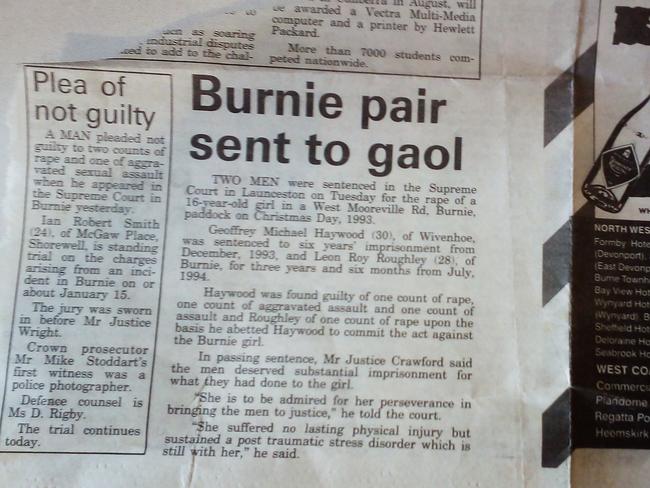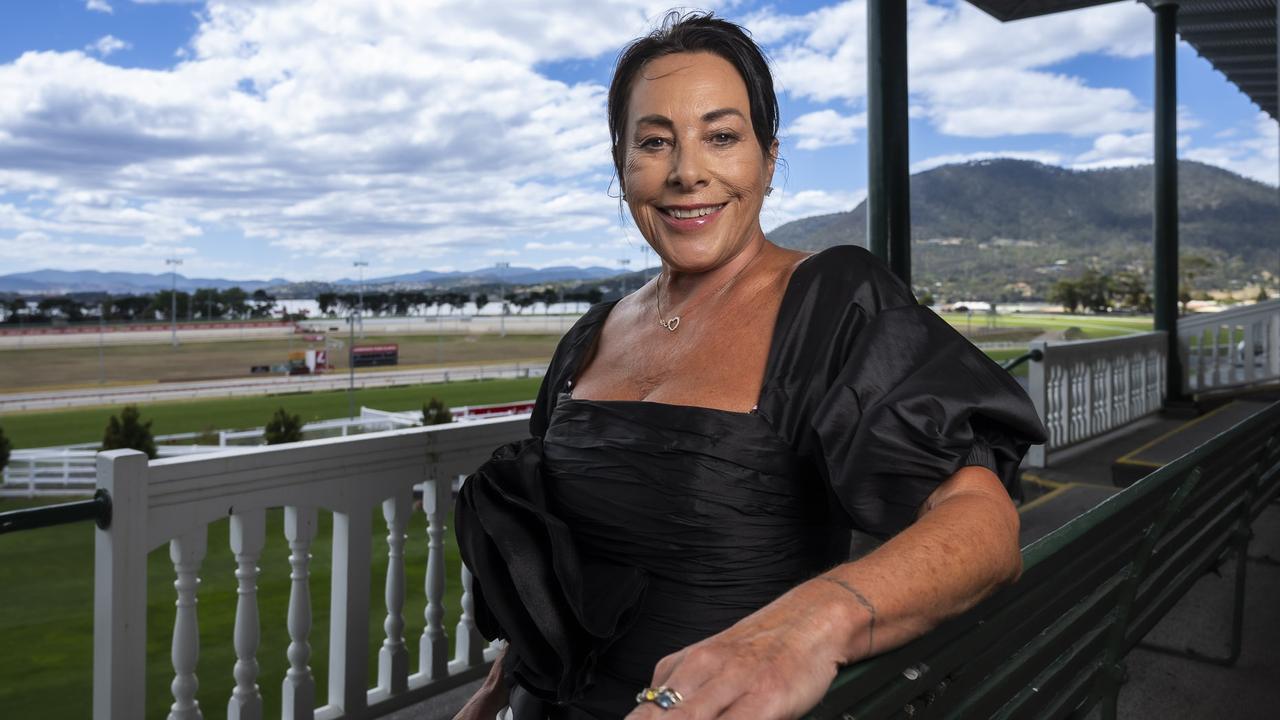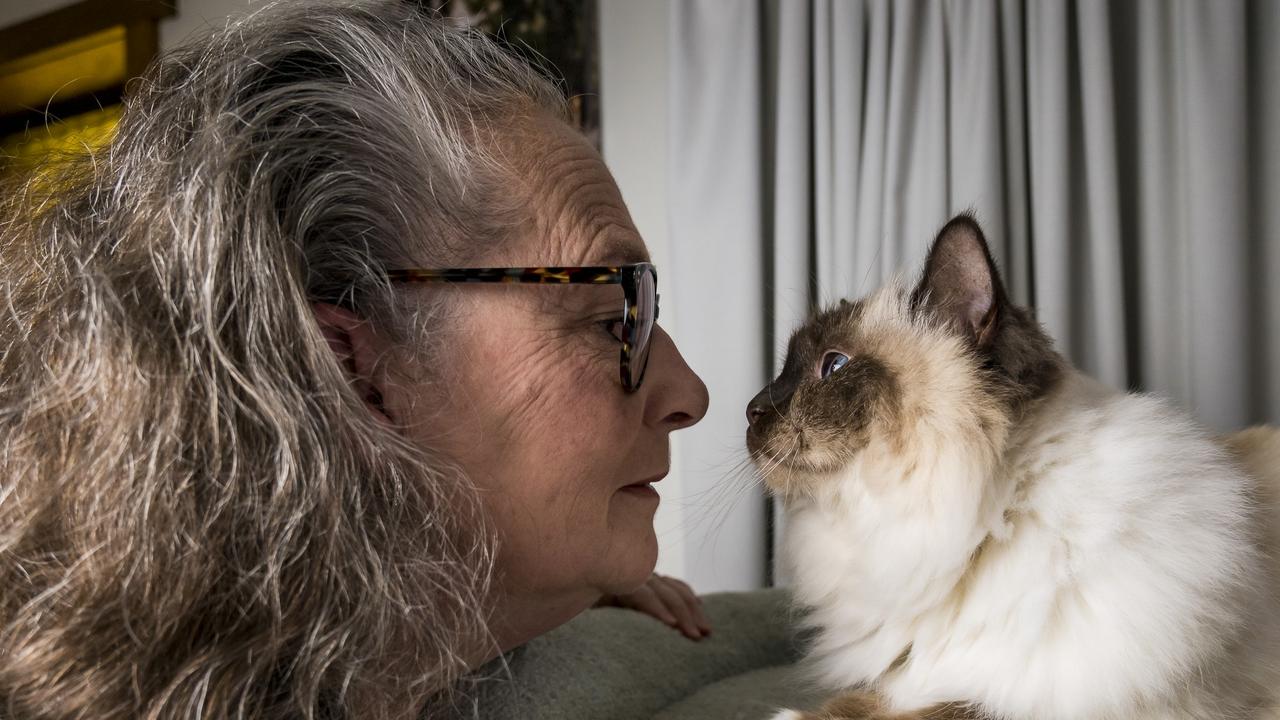Archaic Tasmanian law needs reviewing, say rape survivors
A Tasmanian woman held at knifepoint, bashed and gang raped when she was a schoolgirl, has broken her 25-year silence about the ordeal.

Tasmania
Don't miss out on the headlines from Tasmania. Followed categories will be added to My News.
A TASMANIAN woman held at knifepoint, bashed and gang raped when she was a schoolgirl, has broken her 25-year silence about the ordeal.
The attack happened on Christmas Eve in Burnie in 1993. The then 16-year-old had climbed into a ute with five men who were travelling to the same party she was.
The girl was instead driven to an abandoned paddock where she was terrorised, told she was going to be killed, then brutally raped.
The ringleader, Geoffrey Michael Haywood, then told her she was going to be taken elsewhere to dig her own grave.
The victim’s harrowing story of escape and survival has never before been heard outside of a courtroom.
Nor has she ever spoken publicly about the personal impact of enduring three separate trials.
Now, after news Haywood has died at age 51, the rape survivor says previous fears she held over speaking out have abated and that she is ready to tell her story.
READ LEIA’S* LETTER URGING LEGAL REFORM TO THE ATTORNEY-GENERAL HERE
But the victim has been advised she cannot speak out using her real name, due to an archaic Tasmanian law — section 194K of the Evidence Act — which prohibits all media from naming sexual assault victims, regardless of their consent.
“As a survivor I should have the right to tell my story with my name. Without my name and face, it’s not my story, it’s just my words. You need a name and a face. Every survivor deserves that. It’s an injustice not to allow us our names,” the woman, now 41, told the Sunday Tasmanian.
The woman also hopes to publish a nonfiction memoir about her experience, but under the existing law, any publisher that agrees to print her manuscript could be prosecuted if the book includes her real identity.

The #LetHerSpeak campaign for law reform was launched last year after a sexual assault survivor dubbed “Jane Doe” discovered she could not speak about her experience of abuse under her real name, despite the fact her perpetrator had been sent to jail.
More than 5000 people signed the #LetHerSpeak petition for legal reform, created by End Rape On Campus Australia, in partnership with Marque Lawyers.
“Jane Doe” and the gang rape survivor from Tasmania have banded together to push for the reform and a GoFundMe campaign has been created to help the two sexual assault survivors take their individual fights to be named to the Supreme Court.
“It’s a hideous law and it needs to be changed” says the Tasmanian survivor who has requested to go by the pseudonym Leia*.
“My story has already been told so many times by other people: police, prosecutors, journalists, not to mention, town gossips. I’m the only one who is not allowed to tell it.”
On the night of the attack, Leia had gone into the vehicle willingly. Inside were five men, two of whom she knew: the driver and a passenger, Glen Last, who was a friend. (Neither the driver nor Mr Last have ever been charged with any offence in relation to Leia and both later agreed to assist the prosecution.)
Also in the car that night were three other men, who Leia hadn’t met before: Geoffrey Michael Haywood, 29, Leon Roy Roughley, 27, and Timothy John Marshall, 22. (Charges against Mr Marshall were eventually dropped.)
“I was sitting in the back of the ute on Glen’s knee as we made our way to the party. But when we get to the house, the ute doesn’t stop. My stomach just flipped,” she said.
Leia pleaded with the men to stop driving.
When the vehicle did eventually stop, according to court documents, Haywood said “we should all jump her”.
“Glen opened the car door and told me to get out of the car and run, just run!,” Leia said.
But court documents show Haywood, who was in the back seat, stopped the schoolgirl and grabbed her hair. After a scuffle with Leia, he held a knife to her throat.
Marshall and Haywood then pulled Mr Last from the vehicle, beating him, as Leia pleaded with the driver not to let the men rape her.
Mr Last’s barely conscious body would be found hours later on the side of the road. He later recuperated in hospital.
As the ute was driven further from town, Leia was overcome with an impending feeling of doom and a belief that she would not survive the night.
“We passed a series of paddocks ... Haywood then told the driver to pull over. We stopped and the driver got out and fled on foot, leaving me behind.” A court would later hear that the men then took turns raping and assaulting Leia.
“During it, I felt like I was outside my body looking down. All I could think was ‘I just want to get home to my Mum and Dad,” she said.
“When it was finally over, Haywood sat across my chest, and put a knife to my throat and said ‘I should kill you, you sl.t and dump you in the woods’. He had pure evil in his eyes. I’ve never seen anyone look that way, before or since.”
After the attack, Leia was bundled back into the car.
As Haywood drove along the rural road, Leia sat in the seat behind him, trying to calculate an escape.
It had been raining that Christmas Eve and the roads were slippery. As the ute hurtled along, it suddenly hit something, flipping and crashing.
Leia was knocked unconscious in the crash. When she came to, she crawled out through the window of the upturned vehicle, finding that, by then, Haywood and Roughley had left and only Marshall remained.
A court would later hear Marshall took her at knifepoint – first on foot and then by vehicle – to his brother’s apartment.
To her horror, Haywood and Roughley arrived at the apartment too.
But by then the men appeared to have grown weary and disinterested in her, and instead started drinking and smoking drugs.
As dawn broke, Leia mustered up one final burst of courage. Creeping past the drunk and dozing men, she inched towards the front door, and towards her eventual freedom.
While other children in Tasmania would spend that day opening presents, Leia spent her Christmas Day with police detailing a chilling account of torment and survival.
MORE OF TODAY’S NEWS:
NATURE PARK RESERVED FOR FUTURE
CBD RETAILERS HAVE HOPES AND FEARS ABOUT UTAS MOVE
When the matter went to court in April 1994, Leia found herself accused of being a lying, drug taker who fabricated the rapes to avoid trouble with her parents.
Outside court, Leia says the treatment was just as bad. “People would say, ‘It’s your fault for getting in the car with them’. They would call me the most disgusting names,” she said.
But inside court, Leia persisted.
After a four-week trial, Haywood, Marshall and Roughley were all found guilty of one count of rape.
The men were sentenced to a combined 17 years’ jail.
In February the next year, the men appealed, and their convictions were overturned on a series of technical arguments regarding how evidence was admitted at court.
A second trial resulted in a hung jury, at which point Leia almost gave up hope.
But aided by the Department of Public Prosecutions, she agreed to testify one last time.
“I knew I had to keep going to see it through to the end. I had this drive to prove my truth and when I gave evidence the third time, I remember saying to myself: ‘I will not cry and I will not break down because they win every time I do and I will not let them win’,” she said.
Finally – 19 months after the original attack – Haywood was sentenced to six years’ jail for one count of rape, one count of aggravated assault and one count of assault. Roughley was also found guilty of one count of rape and sentenced to three years and six months’ jail.
The charges against Timothy Marshall were eventually dropped.
MORE OF TODAY’S NEWS:
SALUTE TO TOP POLICE GRADUATES
LABOR PLEDGES TASSIE MENTAL HEALTH UNIT
TASSIE CARTOON SHOW GOES NATIONAL
BOMBERS VICTORY IN TSL ONSLAUGHT
For Leia, finally she had some level of closure and the long road to recovery could begin.
“I hate the word victim, because I’m not a victim. I’m a survivor and a strong one at that. And at the end of the day survivors are awesome people,” she said.
Leia is now doing a bridging course and hopes to study social work and become a court support person for other victims of sexual assault.
She is also a mother, and she recently told her teenage children.
“I wanted them to hear it from [their] mum, rather than hearing it through town gossip. But I also told them because it’s important to me that they respect women and they understand that no means no.”
Do you a story to tell? Contact ninafunnell@gmail.com
Nina Funnell is a Walkley award winning journalist and the creator of the
#LetHerSpeak campaign, in partnership with End Rape On Campus Australia and Marque Lawyers.


